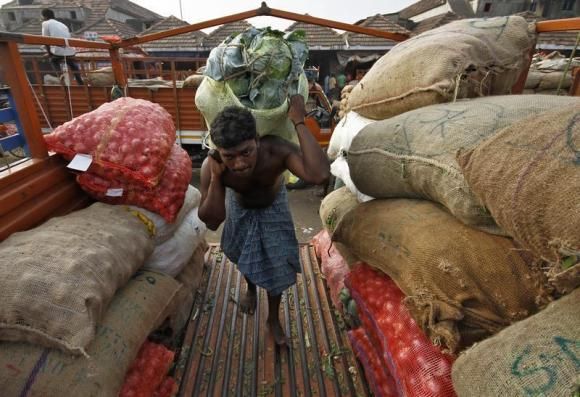 Work in mandis across UP and in northern India which till Tuesday, witnessed heavy arrivals of newly harvested paddy, saw a steep decline.
Work in mandis across UP and in northern India which till Tuesday, witnessed heavy arrivals of newly harvested paddy, saw a steep decline.
On Tuesday evening, when Kolkata’s Sheikh Salim’s last customer offered him a Rs 500 note, he had little clue it would be of little use the next morning. He had planned to buy some extra stock of fish from wholesalers on Wednesday.
“I have not been able to buy even one-tenth of my requirement today (Wednesday), as nobody is accepting the big notes I have,” he said.
That was the scene across wholesale markets, from Delhi’s Chandni Chowk and Sadar Bazaar to Kanpur’s Loha Bazaar and Sarafa Bazaar, or Nagpur’s Itwari Bazar and Gandhi Putla to Mumbai’s Byculla and Kalbadevi. An acute shortage of Rs 100 currency notes had brought trading of the most perishable commodity to a halt, as supply chain crashed.
Work in mandis across Uttar Pradesh and other parts of northern India, which, till Tuesday, witnessed heavy arrivals of newly harvested paddy, saw a steep decline, too.
“Paddy prices are down by Rs 200-250 a quintal today (Wednesday), which would have far-reaching impact on the farmers. It was selling at Rs 2,400-2,450 a quintal,” said Devendra Dhull, general secretary of the Rohtak mandi.
Market watchers said that overnight, many traders have gone bankrupt and might have to shut shop.
According to industry experts, as much as Rs 30,000 crore worth of black money gets circulated among traders in India on a daily basis.
“Wholesale markets mostly run on cash. Suddenly, all the money, which probably is black, has become unusable… I will not be surprised if wholesalers declare bankruptcy or even commit suicide,” said the member of a national trade association.
His views were endorsed by Sanjay Bhargava, general secretary of Delhi’s Chandni Chowk Sarv Vypar Mandal. “There is an absolute blackout in the market. There are no buyers almost anywhere… This may continue for at least a week.”
Pankaj Arora of Kanpur’s Mahanagar Sarafa Association said small traders, who come from nearby areas with cash of Rs 2-5 lakh to make daily purchases, are in a limbo, as no one is ready to take their cash and give them supplies.
According to market experts, the next few weeks would be challenging for the wholesale markets due to an extreme cash crunch.
“This move by the prime minister is hurting a lot of traders, who were using unaccounted capital for trade…. However, in the long run, this would help in creating a level playing field for trade,” said Praveen Khandelwal, secretary-general of Confederation of All India Traders.
The highest damage this move could cause, though temporarily, would be on farmers, who had recently harvested their paddy crop, and were preparing for the next Rabi season.
Most transactions in rural markets are done in cash, which also include payments to be made to labourers. Farmers are worried that, in the absence of new currency notes, they might miss out on the crucial sowing time.
The cash received from the selling of farm produce has become useless because of discontinuation of the Rs 500 and Rs 1,000 currency notes, says Sudhir Panwar, who is also the head of Kisan Jagriti Manch, a farmers’ forum. It will take another 15-20 days for the new system to stabilise.
Image used for representational purposes only. Photograph: Babu/Reuters











